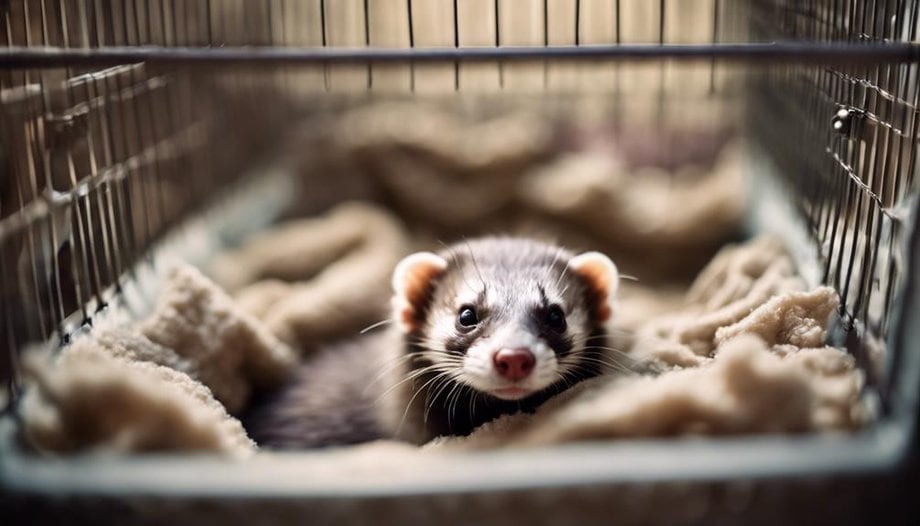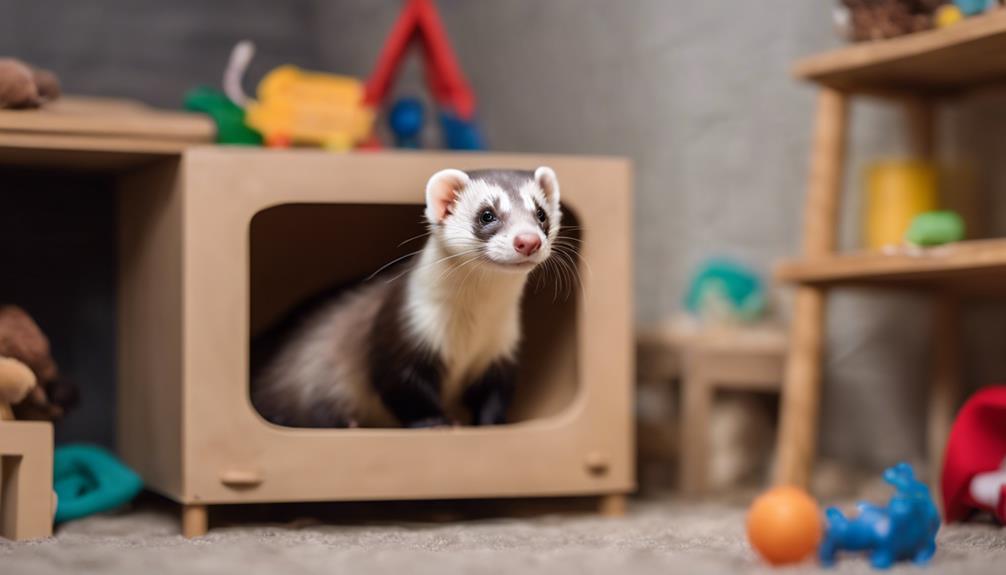How to Ensure Your Ferret's Habitat Stays Smell-Free

Keeping your ferret's habitat clean is essential for reducing odors. Regularly clean the cage and litter box to remove waste and debris. Use ferret-safe cleaning products to disinfect the cage and eliminate odors. Provide fresh bedding and wash it frequently to keep it smelling fresh. Ensure proper ventilation in the room where the cage is located to prevent stagnant air. Additionally, consider using air purifiers or odor neutralizers to maintain a pleasant environment for both you and your ferret.
By following these simple steps, you can effectively minimize odors in your ferret's habitat and create a more enjoyable living space for both you and your furry friend.
Proper Ventilation
To ensure a smell-free ferret habitat, proper ventilation plays a crucial role in maintaining air quality and freshness. Adequate air circulation is essential in preventing odors from lingering and ensuring a healthy environment for your furry companions. Ventilation systems help in removing stale air and replacing it with fresh, clean air, reducing the buildup of odors within the habitat.
When considering ventilation systems for your ferret's living space, it's important to choose options that facilitate proper air exchange without causing drafts or temperature fluctuations that could stress your pets. Installing exhaust fans or air vents can help in regulating airflow and eliminating any stagnant pockets where odors may accumulate. Additionally, placing the habitat in a well-ventilated area of your home can also aid in maintaining a pleasant atmosphere for both you and your ferrets.
Regular Cleaning Schedule

Maintaining a regular cleaning schedule is essential for keeping your ferret's habitat odor-free and hygienic. To ensure a fresh environment for your furry friend, consider the following tips:
- Frequent Spot Cleaning: Remove any soiled bedding, litter, or droppings daily to prevent odors from accumulating.
- Weekly Cage Deep Clean: Thoroughly wash and disinfect the cage and its accessories using pet-safe cleaning products to eliminate germs and odors.
- Washing Fabrics: Regularly launder your ferret's bedding, hammocks, and toys to keep them clean and fresh.
- Ventilation: Allow fresh air to circulate by opening windows or using a fan, which can help reduce odors and maintain a pleasant living environment for your ferret.
High-Quality Bedding Choices

When selecting bedding for a ferret habitat, it's crucial to opt for materials that are highly absorbent to help control moisture and odors.
Look for bedding choices specifically designed to control odors, as this can significantly reduce any smells in the habitat.
Additionally, remember to change the bedding regularly to maintain a fresh and clean environment for your ferret.
Absorbent Bedding Materials
Using highly absorbent bedding materials is essential for maintaining a clean and odor-free environment in a ferret habitat. When choosing bedding for your ferret's space, opt for materials that excel in absorption and scent prevention. Here are some high-quality bedding choices to consider:
- Paper-based bedding: Environmentally friendly and highly absorbent, this bedding helps control odors effectively.
- Aspen shavings: These shavings are absorbent, safe, and have natural odor-controlling properties.
- Coconut husk bedding: Known for its superior absorption capabilities, this bedding reduces unwanted smells.
- Corn cob bedding: A natural option that's absorbent and helps in preventing strong odors from developing.
Odor-Control Properties
High-quality bedding choices with superior odor-control properties are essential for creating a fresh and pleasant environment in a ferret habitat. When selecting bedding for your ferret's habitat, consider using scented litter specifically designed to neutralize odors effectively. Scented litter not only absorbs moisture but also helps mask any unwanted smells that may arise.
Additionally, incorporating air purifiers in the ferret's living space can further aid in maintaining a clean-smelling environment. Air purifiers work by filtering out impurities in the air, reducing odors, and promoting better air quality for both your ferret and yourself.
Regular Bedding Changes
To maintain a fresh and hygienic environment for your ferret, it's crucial to regularly change the bedding, opting for high-quality choices that offer superior odor control. When selecting bedding for your furry friend, consider the following high-quality options for optimal bedding hygiene and odor prevention:
- Paper-Based Bedding: Absorbent and dust-free, ideal for ferrets with respiratory sensitivities.
- Wood Pellets: Excellent at controlling odors, providing a natural and cozy environment for your ferret.
- Fleece Liners: Reusable and soft, these liners are comfortable for your ferret and easy to clean, promoting good hygiene.
- Hypoallergenic Bedding: Suitable for ferrets with allergies, preventing skin irritation and maintaining a fresh-smelling habitat.
Strategic Litter Box Placement

Strategically placing the litter box in your ferret's habitat is essential for maintaining a clean and odor-free environment. Ferrets have specific preferences when it comes to their bathroom habits. They tend to favor hidden corners or secluded areas for their litter boxes, mimicking their natural instinct to burrow and find privacy. Understanding your ferret's scent preferences can guide you in choosing the most suitable location for the litter box. Placing it in a well-ventilated area that's easily accessible for your ferret, yet somewhat secluded from their play and sleep areas, can help in minimizing odors.
When selecting the spot for the litter box, consider placing it away from their feeding and sleeping areas. This separation can help in maintaining a hygienic environment and reducing the chances of your ferret eliminating outside the box. Additionally, placing the litter box in a corner or against a wall can provide a sense of security for your ferret while ensuring easy access for cleaning and maintenance. By strategically positioning the litter box based on your ferret's preferences, you can significantly contribute to a smell-free habitat.
Odor-Control Products

When maintaining a smell-free ferret habitat, utilizing effective odor-control products can play a crucial role in managing unwanted scents. Here are some considerations to keep in mind when choosing the right products:
- Scented vs. unscented products: Scented products can mask odors temporarily but may be overwhelming for sensitive ferret noses. Unscented options are gentle on your pet's senses while effectively eliminating smells.
- Natural vs. chemical options: Natural products often use plant-based ingredients that neutralize odors without harsh chemicals. On the other hand, chemical options may offer stronger odor-fighting capabilities but could pose risks to your ferret's health.
- Proper ventilation: Ensure the cage has adequate airflow to prevent odors from lingering. Good ventilation can help reduce the need for heavy-duty odor-control products.
- Regular cleaning: No product can replace the importance of regular cage cleaning. Maintain a cleaning schedule to prevent odors from building up and overpowering your ferret's habitat.
Fresh Air and Natural Light

To maintain a smell-free environment for ferrets, proper ventilation is crucial as it helps control odors by circulating fresh air throughout the habitat.
Natural light not only brightens up the space but also acts as a natural disinfectant, helping to reduce bacteria and odors.
Ensuring good airflow within the ferret habitat can significantly decrease smells by preventing stagnant air and promoting a fresher environment.
Ventilation for Odor Control
Proper ventilation in a ferret habitat is essential for controlling odors and ensuring a healthy living environment for your furry companions. To maintain a smell-free habitat, consider the following ventilation tips:
- Air Purifiers: Invest in air purifiers to help eliminate odors and improve air quality within the ferret habitat.
- Ventilation: Ensure proper air circulation by using window fans or exhaust vents to remove stale air and prevent the buildup of unpleasant odors.
- Natural Light: Allow natural light to enter the habitat as it can help reduce moisture and inhibit the growth of odor-causing bacteria.
- Regular Cleaning: Maintain a regular cleaning schedule to remove waste and soiled bedding promptly, contributing to a fresh-smelling environment for your ferrets.
Sunlight for Natural Disinfection
Ensuring proper ventilation in a ferret habitat not only controls odors but also creates a healthy living space; introducing natural light for disinfection further enhances the environment.
Sunlight benefits play a crucial role in maintaining a fresh and clean habitat for ferrets. Sunlight has natural disinfecting power that can help reduce bacteria and other harmful microorganisms present in the air and on surfaces. By allowing sunlight to enter the ferret habitat, you can help disinfect the space effectively.
Positioning the cage near a window or providing access to natural light sources can make a significant difference in keeping the environment hygienic and odor-free for your beloved ferret.
Airflow to Reduce Smells
Introducing adequate airflow into a ferret habitat, along with natural light, is essential for reducing odors and maintaining a healthy living environment for these pets. To ensure proper air circulation and odor prevention in your ferret's habitat, consider the following tips:
- Ventilation: Install a ventilation system or place a fan near the habitat to keep the air circulating.
- Open Windows: Whenever possible, open windows to let fresh air flow through the room.
- Natural Light: Allow natural light to enter the habitat as it helps in disinfecting and reducing odors.
- Avoid Stuffiness: Keep the habitat clutter-free to prevent any blockage of airflow.
Monitoring Ferret's Diet
Maintaining a balanced diet for ferrets is essential to their overall health and well-being. A proper ferret diet should consist mainly of high-quality, protein-rich foods specifically formulated for ferrets. This diet should contain around 32-38% protein and 15-20% fat to meet their unique nutritional needs. It's crucial to avoid feeding them dog food, as it lacks the necessary nutrients that ferrets require.
To ensure the nutritional balance of your ferret's diet, consider offering a mix of commercial ferret food, raw or cooked meat (like chicken or turkey), and occasional treats such as eggs or small amounts of fruits and vegetables. Always provide fresh water in a sipper bottle to keep them hydrated.
Regularly monitoring your ferret's diet is vital. Keep track of the amount of food consumed daily to detect any changes that might indicate health issues. Consulting with a veterinarian specializing in exotic pets can help you create a diet plan tailored to your ferret's specific needs. Remember, a well-balanced diet is the foundation for a healthy and happy ferret.
Frequently Asked Questions
What Are Some Common Mistakes That Ferret Owners Make That Can Contribute to a Smelly Habitat?
Ferret owners often overlook the importance of a consistent cleaning schedule and proper litter choices. Poor ventilation and neglecting toy hygiene can also lead to a smelly habitat. These simple steps can greatly improve the living environment for ferrets.
Are There Any Specific Types of Bedding That Should Be Avoided to Prevent Odors in a Ferret's Habitat?
Steering clear of certain bedding choices can be a wise move to maintain a fresh-smelling ferret habitat. Opt for alternatives like paper-based bedding or cloth liners to help prevent odors and keep your furry friend's home smelling pleasant.
How Often Should I Replace the Bedding in My Ferret's Cage to Maintain a Smell-Free Environment?
To maintain a smell-free habitat for ferrets, it's crucial to replace bedding frequently. A regular cleaning routine, coupled with good ventilation strategies, can help minimize odors. This ensures a healthy and comfortable environment for the ferret.
Can Certain Foods or Treats Impact the Smell of My Ferret's Habitat, and if So, What Should I Avoid Feeding Them?
Certain foods and treats can impact a ferret's habitat smell. To maintain odor control, avoid feeding them items high in sugars, dairy, or fish. Opt for quality ferret-specific foods and treats to help prevent unwanted odors.
Are There Any Natural Remedies or DIY Solutions for Controlling Odors in a Ferret's Habitat That I Can Try in Addition to Using Odor-Control Products?
When looking to tackle ferret habitat odors, consider natural remedies and DIY solutions in addition to odor control products. These alternatives, like baking soda or vinegar solutions, can help keep the habitat fresh and pleasant.











